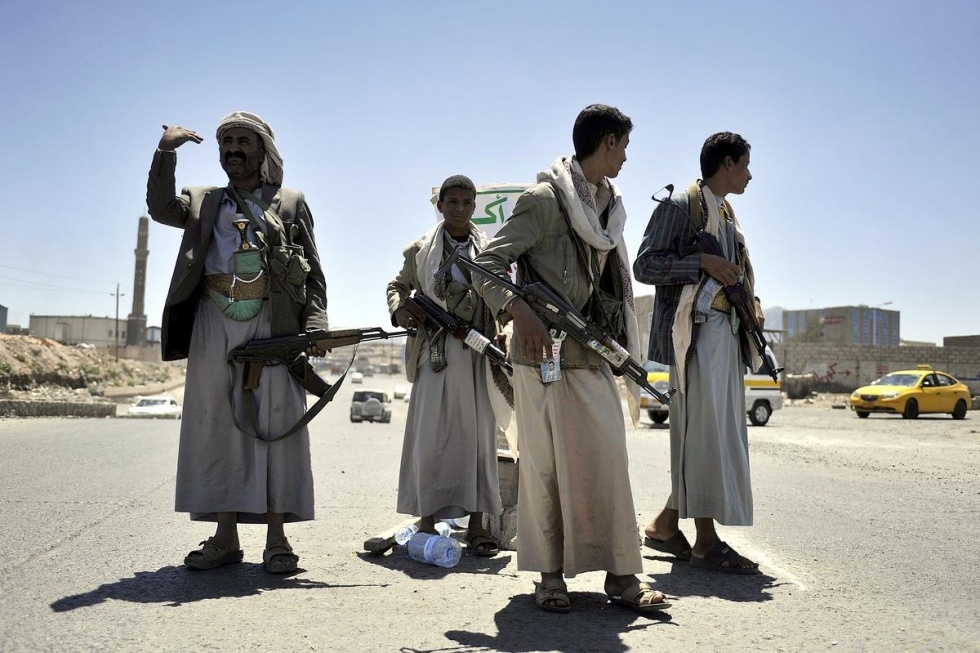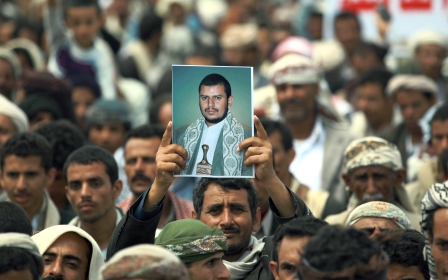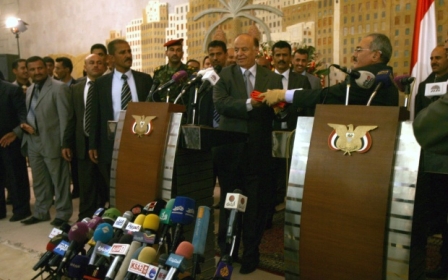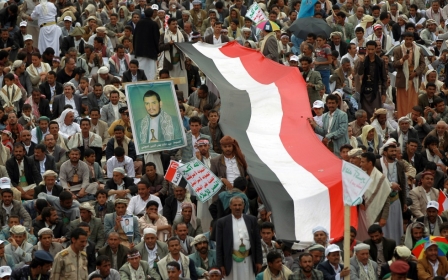Houthi rebels refuse to quit Yemen's capital

Yemen's Houthi rebels who have seized the capital Sana'a will not withdraw from the streets despite singing a UN-brokered deal to give them more influence with the Sunni-dominated government.
A Houthi spokesman told Middle East Eye that the rebels, would not retreat to their mountainous stronghold but instead stay to secure the capital.
"We cannot leave the capital as the security services are not in the streets. If we leave, we leave the streets to al-Qaeda," said Mohamed Abdulsalam. "The government has to take responsibility. To ask us to withdraw first to allows terrorists to attack."
After a protests against rising fuel prices the Houthis last week stormed the capital with heavy weapons battling fighters allied with the Sunni al-Islah party for control of houses and ministry buildings. The government has agreed to appoint a new prime minister and change the cabinet but the Houthis have refused to back off saying they want guaranteed involvement in a power-sharing agreement.
A wave of attacks by al-Qaeda-linked militants against the Houthis has raised fears that the impoverished Arabian nation may be descending into sectarian war.
The Houthis have been the target of three bomb attacks in the last four days by Ansar al-Shariah, Sunni radicals who have declared an open war against the Shiite insurgents.
On Sunday a suicide bomber targeted a hospital in eastern Yemen.
Ahmed Sharabi, a 24-year-old Yemeni journalist, was having lunch across the road from al-Jafra hospital in Mareb, a province 80km east of Sana’a on Sunday afternoon, when a car laden with explosives pulled up in front of the infirmary and exploded, sending debris flying across the street.
"It was a huge explosion, glass fell from the sky," Sharabi said. "The heat burned the hair on the back of my neck. I could smell smoke. People were screaming. Lots of people were running and screaming.”
At least eighteen people were killed and over fifty injured in the blast, including several hospital staff, according to Sharabi who spoke to Middle East Eye via Skype. “It was chaos,” said Sharabi. “There was blood all over the street.”
Hours after the bombing, Ansar al-Sharia said in a statement on its Twitter account that it had carried out the attack. Sharabi said the hospital was being used by Houthi fighters to treat their wounded from battles with government forces.
Ansar al-Sharia have carried out numerous attacks on military and civilians installations of the US-allied Yemeni government. But the group, which adheres to an austere brand of Sunni Islam which views Shi'ites as heretics, has turned its attention to the Houthis who have emerged as a dominant political force since the 2012 uprising that overthrew Ali Abdullah Saleh.
Last week, Ansar al-Shara vowed on Wednesday to fight the rebels in defence of Sunni Muslims.
"We have unsheathed our sharp swords to defend you," Al-Qaeda in the Arabian Peninsula said in a statement, warning the Shiite rebels of the "unbearable."
"Your heads will fly off."
Since seizing control of the capital last week and after fighting with soldiers loyal to the Sunni Muslim Islah party, the Houthis have refused to quit the city, despite an agreement signed with President Abd-Rabbu Mansour Hadi to make them a part of the government.
On Saturday, local media reported that Houthi gunmen surrounded the residence of the National Security Bureau Chief in Sana’a accusing the bureau of working closely with the US Central Intelligence Agency and demanding the chief's resignation.
The deadlock with the Houthis, a heavily-armed group who for years fought an on-off civil war with the Sana’a government, has alarmed Western and Arab allies who fear that further instability in the impoverished southern Arabian nation could unsettle the balance of power in the region and allow violent Islamist groups to prosper.
Threatening to pursue sanctions, America condemned the Houthi leadership in a State Department statement on Saturday for its aggressive actions and called on the group to hand over weapons to the state. It also accused politicians loyal to former president Ali Abdullah Saleh's government of using violence to pursue their own agendas. Some Yemenis have recently accused Saleh of plotting a comeback.
Saudi fears
The deadlock with the Houthis, who the government accuses of trying to establish an Iran-style Shiite theocracy in northern Yemen, has alarmed Western and Arab allies who fear that further instability in the impoverished southern Arabian nation could unsettle the balance of power in the region and allow violent Islamist groups to prosper.
Sunni-dominated Saudi Arabia, the world's largest oil exporter which shares a long border with Yemen, saidon Monday that its neighbor faces "unprecedented challenges" and risks sliding toward further violence if swift action is not taken to deal with the instability.
In some of his strongest language about Yemen to date, Saudi Foreign Minister Prince Saud al-Faisal told the U.N. General Assembly that hopes for an end to the crisis had been wrecked by what he suggested was the Houthis' failure to honor the deal.
Some analysts say the kingdom, a key U.S. ally which views itself as protector of Sunni Islam, is troubled by the rise of the Houthis that they see as benefiting its main regional foe Iran.
Others speak of a more complex Saudi role, noting that the Houthis have largely been battling Islah, Yemen's Muslim Brotherhood, a group the Kingdom has criticized across the region and, in the case of Egypt, backed a military general who overthrow them.
Sana’a crumbling
High schools in Sana’a reopened on Monday after a week of clashes forced closures but residents of the capital say the city remains a dangerous place divided between militias who have set up checkpoints, some guarded by child soldiers, and turned government buildings and houses into makeshift garrisons.
On Sunday, Yemenis took to the streets of Sana’a to demand the withdrawal of the Houthis, in a first protest against the group since they overran the capital. Organisers say they had hoped for a turn-out of several thousand but only a few hundred showed up.
“The streets are ruled by men with guns, the government has failed,” said Sara Mohammed, a prominent activist. “In 2011, we had a voice but now most people just feel trapped between warring factions and fear civil war. Things have only got worse for us since the so-called Arab revolution.”
Stay informed with MEE's newsletters
Sign up to get the latest alerts, insights and analysis, starting with Turkey Unpacked
Middle East Eye delivers independent and unrivalled coverage and analysis of the Middle East, North Africa and beyond. To learn more about republishing this content and the associated fees, please fill out this form. More about MEE can be found here.




